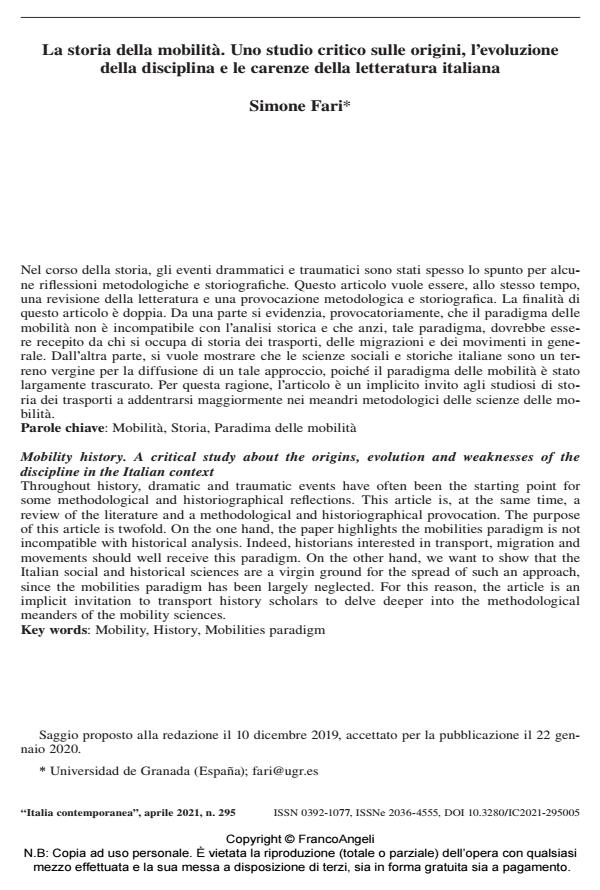La storia della mobilità. Uno studio critico sulle origini, l’evoluzione della disciplina e le carenze della letteratura italiana
Titolo Rivista ITALIA CONTEMPORANEA
Autori/Curatori Simone Fari
Anno di pubblicazione 2021 Fascicolo 2021/295
Lingua Italiano Numero pagine 22 P. 99-120 Dimensione file 166 KB
DOI 10.3280/IC2021-295005
Il DOI è il codice a barre della proprietà intellettuale: per saperne di più
clicca qui
Qui sotto puoi vedere in anteprima la prima pagina di questo articolo.
Se questo articolo ti interessa, lo puoi acquistare (e scaricare in formato pdf) seguendo le facili indicazioni per acquistare il download credit. Acquista Download Credits per scaricare questo Articolo in formato PDF

FrancoAngeli è membro della Publishers International Linking Association, Inc (PILA), associazione indipendente e non profit per facilitare (attraverso i servizi tecnologici implementati da CrossRef.org) l’accesso degli studiosi ai contenuti digitali nelle pubblicazioni professionali e scientifiche.
Nel corso della storia, gli eventi drammatici e traumatici sono stati spesso lo spunto per alcune riflessio-ni metodologiche e storiografiche. Questo articolo vuole essere, allo stesso tempo, una revisione della letteratura e una provocazione metodologica e storiografica. La finalità di questo articolo è doppia. Da una parte si evidenzia, provocatoriamente, che il paradigma delle mobilità non è incompatibile con l’analisi storica e che anzi, tale paradigma, dovrebbe essere recepito da chi si occupa di storia dei tra-sporti, delle migrazioni e dei movimenti in generale. Dall’altra parte, si vuole mostrare che le scienze sociali e storiche italiane sono un terreno vergine per la diffusione di un tale approccio, poiché il para-digma delle mobilità è stato largamente trascurato. Per questa ragione, l’articolo è un implicito invito agli studiosi di storia dei trasporti a addentrarsi maggiormente nei meandri metodologici delle scienze delle mobilità.
Parole chiave:Mobilità, Storia, Paradima delle mobilità
Simone Fari, La storia della mobilità. Uno studio critico sulle origini, l’evoluzione della disciplina e le carenze della letteratura italiana in "ITALIA CONTEMPORANEA" 295/2021, pp 99-120, DOI: 10.3280/IC2021-295005